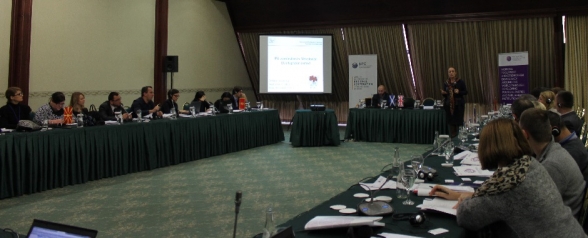Two-day regional training, devoted to mechanisms of parliamentary control of IPA funds, was marked by the discussion on objectives and structure of IPA programmes including coordination mechanisms between the government and parliamentary service in monitoring the use of IPA funds.
Apart from bringing together parliamentary staff from the region and exchange of views on committees’ competences, the training was aimed at improving the knowledge about reporting on the use of IPA funds in terms of the structure of information that is necessary to provide for preparation of reports on IPA projects as well as organisation of hearings of government’s representatives, especially national coordinators responsible for implementation of IPA programmes.
On the day one of the training, the officers had an opportunity to hear presentations of representatives of the European Policy Institute (EPI) on objectives and structure of IPA programmes as well as on pre-accession help intended for improvement of democratic institutions, economic and social reforms, particularly of transition countries. On that occasion, it was emphasised that it was necessary to harmonise IPA funds with the use of domestic funds, and with regard to that, that attention was paid to parliamentary mechanisms for supervising a government in spending the IPA funds.
Additionally, the representative of the Scottish Parliament focused his presentation on the topic of strengthening the oversight role of the parliament over the spending of IPA funds and other EU funds, referring also to the type of control and responsibility of the executive power. Divided by working groups, from the point of view of their working bodies, the employees presented the state of the oversight mechanisms in countries they came from.
On the day two of the training, the Head of the Sector for Coordination of Foreign Assistance of Macedonia, presented mechanisms of coordination between government and parliamentary staff in the process of controlling IPA funds, also informing the participants of the training on possible models of drafting information in preparation of short reports on IPA projects.
Representatives of the Institute for European Policy presented the Handbook on Instrument for Pre-Accession Assistance and surveillance, intended for parliamentarians and parliamentary staff. It was emphasised that the purpose of the Handbook was to help MPs and parliamentary staff to better understand the IPA concept and to facilitate their participation in parliament’s supervision of the IPA .
In addition, IPA 2 was presented in the context of preparation of the new seven-year budget of the European Union, for the period 2014-2020, by which the “revision” of the current instrument of pre-accession support is planned; afterwards the debate was focused on challenges standing in front of the regional countries aimed at efficient and effective withdrawal of funds.
The regional training was organised by the Regional Network of Parliamentary Committees on Economy, Finance and European Integration of the Western Balkans, with the financial support of Westminster Foundation for Democracy. The training gathered employees from the regional countries, namely: Montenegro, Albania, Bosnia and Herzegovina, Kosovo, Macedonia and Serbia. On behalf of the Parliament of Montenegro, employees of the Committee on Economy, Finance and Budget and Committee on European Integration participated in the training.









